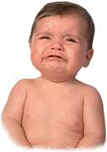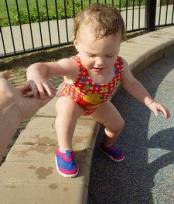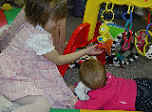


Brain Development and Growth:
-
It's
Important to know that a childís brain grows and develops rapidly within the
first two years or his or hers life.
* Brain development is rooted from different experiences.
-Experience-expectant: functions of the brain use basic experiences In order to develop.
-Experience-dependant:
functions of the brain that rely on specific and "variable events"
In order to develop.
Other
Helpful Websites on Brain Development:
http://www.envisagedesign.com/ohbaby/smart.html
http://www.cincypost.com/news/brainchild/news_brain4primer.html
Proper Growth and Nutrition:
*Average Body weighs a little more than 7 pounds and measures to about 20 Inches.
*A
baby grows about an Inch a month for the first six months of his or her life and
then slows down by a small
amount.
*By a childís second birthday they should weigh around 30 pounds.
*Proper
sleep is very Important, an Infant should sleep a total of 16 hours a
day
and a toddler should average around 13 hours, (And It is completely
normal
for babies to wake up a few times during the night)
As well as sleep,
nutrition is extremely important in maintaining a childís health and growth.
*It is very important to breast-feed an Infant if possible because breast
milk contains colostrum. Colostrum Is Important for a newborn because it is high
in calories, it protects against Illness, allergy, ache, and pain, and it
provides antibodies to protect the baby from diseases.
*Another
thing a mother should be careful of is under nutrition, which results in a child
being smaller than he, or she should be. This is often caused when a mother
switches from breast milk to formula to quickly. That is why it is important for
mothers to check with doctors before making the transition to different
formulas.
Useful
Websites:
Breast-feeding:
http://www.4woman.gov/Breastfeeding/
Proper
Sleep:
http://www.webhealthcentre.com/general/yc_sleep.asp
http://www.tau.ac.il/~sadeh/baby/about_sleep.html
Proper Nutrition: http://allsands.com/Kids/Health/nutritionforto_vop_gn.htm
Hearing,
Seeing and Tasting:
*Babies are born with 20/400 vision. Newborns can only focus on objects between 4 and 30 inches away making their vision quite blurry and by 6 weeks babies can usually recognize their parents smile.
*Then
finally at about 14 weeks the child develops his or hers binocular vision which
is the ability for the two eyes to focus on one image.
Useful
Websites:
Babies
Vision:
http://www.greateyecare.com/eyeknowledge/optics/babiesvision.html
http://www.goodeyedoc.com/babies.htm
http://www.iupui.edu/~ophthal/html/eyes_babiesvision.html
The Importance of Touch, Taste and Smell
* Babies are sensitive to touch, taste, and smell.
A child learns the smell and touch of his or her parents at an early age.
* Ever wonder why babies put everything in their mouths? Well they like to
explore things within their grasp with their tongues, gums, and lips because
they are sensitive. Babies usually begin this process at one year of age.
*Often in order to comfort a baby we will rock or
carry that child this is because the baby is soothed through he familiar touch.
This also comes into play with Breast-feeding. A baby is at ease because he or
she connects the taste, smell, and touch together.
Motor Skills:
* The first to develop in an infant are reflexes. The first reflex to
occur is very important it is the breathing reflex. Other important reflexes
include crying and shivering which lets parents know when the child is cold,
hungry, dirty, etc. There is also the feeding reflex, which includes the sucking
action, which allows the intake of food for proper nutrition and growth.
 * Gross
Motor Skills include large body movements. This is when babies start to gain
muscle strength and begin to move about. These are the average ages in which
babies should be completing these specific actions.
* Gross
Motor Skills include large body movements. This is when babies start to gain
muscle strength and begin to move about. These are the average ages in which
babies should be completing these specific actions.
7 months- A
baby should be able to do the belly crawl.
8-10 months- A
baby should be crawling on all fours.
9 months- A
baby should be able to walk with help.
10 months- A baby
should be able to stand-alone.
12 months- A
baby should be able to walk on ones own!
Useful
Websites:
Motor
Skills in General: http://www.parents.com/articles/ages_and_stages/3039.jsp
Learning
to Crawl: http://www.parents.com/articles/ages_and_stages/3272.jsp
* Fine
motor skills include the
small body movements. These are the average ages in which babies should be
completing these actions.

2 months- A baby should be able to wave and grab for dangling objects.
3 months- A baby should be able to reach and touch objects.
4 months- A baby can grab an object although his or her timing is
usually off.
6 months- A baby can grab and keep hold of a specific object often
moving them hand to hand.
8 to 9 months- A baby can catch an object tossed at them.
11 to 12 months- A baby can use both hands to catch an object
thrown at them.
*During this time period a child will also learn to point at things and
speak with their hands.
∑
Not all babies develop this quickly this is just
the average ages for these tasks. However if a baby isnít following close to
these guidelines its smart to double check with a physician.
Useful
Websites:
Suggestions for Toys: http://betterkidcare.psu.edu/UnitsWeb/BabyPlay/BabyPlayLesson.html
http://earlybloomers.com/articles/article_childsplay.html
Importance
of Physician Visits:
* Itís very important that a parent schedules and regularly takes their
child for check-ups with their doctor. It is important to make sure the baby is
receiving proper nutrition, developing properly, and getting the proper and
required vaccines to protect them against harmful diseases.
*These are all the important facts that a parent should know in order to
maintain an infant and toddlers health within their biosocial development.
Useful
Websites:
Why itís Important: http://health.asiangate.com/English/Immunization_TheImportanceOfChildhoodImmunizations.html
This portion of the website was created by Randi
Hranich.
Works Cited
Berger, Kathleen S. (2003). The Developing Person: Through Childhood and Adolescence. NewYork: Worth